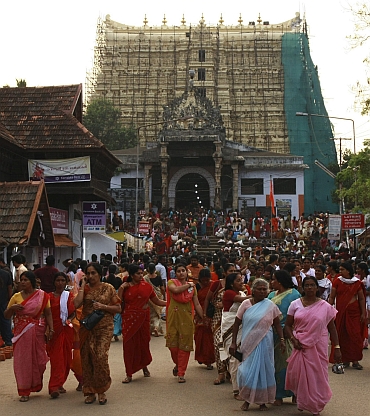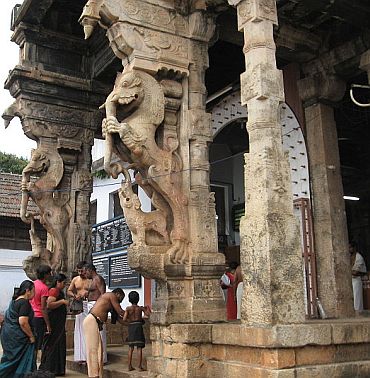
A bench of justices R V Raveendran and A K Patnaik asked the petitioner Raja Marthanda Varma, erstwhile Prince of Travancore, and the Kerala government to come out with appropriate suggestions for ensuring sanctity and security of the ancient temple which has come to the limelight following discovery of the huge wealth.
The apex court while restraining the opening of vault B and also the vault A posted the matter for further hearing on next Thursday.
"The royal family is not claiming any ownership. It is a public temple. It is not claiming any ownership of property. No part of it belongs to any member of the family. The property belongs to Lord Padmanabhaswamy," he told the bench.
The royal family, which is the trustee of the temple has challenged the Kerala government's decision to take over the administration of the temple which was earlier upheld by the Kerala high court.
During Friday's arguments, the bench observed that utmost security should be ensured in and around the temple in view of the discovery of the huge wealth.

Counsel Venugopal also clarified that the value of the treasure reportedly discovered from the temple was not authentic as they were mere media speculations.
"So they were valuation by the media. They are newspaper valuations," the bench remarked.
The apex court, during the last hearing on July 6, had directed videography of the ongoing unearthing of treasure trove inside the chambers of the temple.
The bench had proposed the appointment of a curator of a museum to preserve the treasure being unearthed from the centuries-old temple in Kerala. The treasures found from cellars of the temple are estimated to be around Rs 1 lakh crore.

The court had also barred the observer, supervising the unearthing of the temple's treasure, from giving any interview of the process, saying the matter is related to the state.
The apex court had earlier passed an interim order on a plea filed by Rama Varma's uncle Marthanda Varma staying the high court's order for takeover of the management and assets of the temple.
While hearing the petition, the court had directed that "there shall be a detailed inventory of the articles, valuables and ornaments found from the temple's treasure trove."